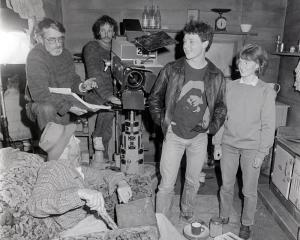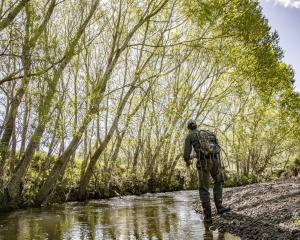We are such creatures of habit.
It was only because the canine passenger's Canterbury accommodation (the Bark Royal, no less) took us out towards Rangiora - and thus in the opposite direction to our southern destination - that we thought of the scenic route.
So circumstance rather than curiosity led us along Tram Road, running like a giant's scorched arrow across the browning plains, towards the hinterland.
Here, on Route 72, we found the small settlement of Oxford.
One might imagine it to lie, like an afterthought, or a dusty relic, in gradual decline out there on the edge of the flatlands, time and fashion diminishing its relevance to the grand metropolis of Christchurch to the east.
But not a bit of it.
It was market day. There was barely a place to park on the main street. It looked prosperous and inviting.
We sought a place for coffee and were rewarded by the discovery of Jo Seager's place: Seagars at Oxford, Cook School and Café.
On Sunday morning it was abuzz: brunch patrons and caffeine fiends, shoppers and gawpers taking in an establishment which, for sophistication and interest, would not be out of place in Sydney.
The recession clearly has not reached this particular pocket of north Canterbury yet.
Beyond Oxford, the scenic route takes you to the Waimakariri Gorge and an old narrow bridge.
From its elevated perch across a rocky narrows, the river is a brilliant emerald green, lazily majestic as it begins to spread out and feel its way towards the sea.
Similarly the Rakaia, a distance further south.
From such pinch-points these braided anarchic water courses acquire a new splendour, as does the entire countryside.
The proximity of the hills and the alps beyond allows a contrast and a perspective - an appreciation of beauty - lost on a main highway that channels its traffic singlemindedly towards destinations north and south.
Although it would be more like afternoon tea, we pushed on through busy Geraldine rejoining State Highway 1 at Winchester and heading for lunch at the Riverstone Café just south of the Waitaki River.
Like the Oxford establishment, for a first-timer Riverstone is a stylish, airy surprise, speaking of imagination and enterprise, of vision and drive.
We ate a platter of tasty morsels, drank particularly fine coffee, and rested, headed back out on to the highway.
The road less travelled can be a revelation, neutralising stasis and complacency, offering possibilities of seeing things afresh.
Change, once embraced, is invigorating.
Today, all eyes are on the United States as it changes presidents amid unprecedented revelry.
They're having one heck of a party. And don't they do all that ceremony and celebration in style?
I'm reminded of an old Italian flatmate in London. A committed atheist, he once astonished me by saying that when he got married he would like it to be in a church.
Why? "All that ritual . . . it's so beautiful," he declaimed, waving his arms about with gusto.
And he had a point.
Public ritual gives us the architecture on which to hang our hopes and banish our fears.
And if there is more than the usual ritualistic fervour to the inauguration of Barack Obama it is because there is plenty to be feared and much to be hoped for.
The US has lost its economic preeminence, its moral ascendancy and the mantle of legitimacy to its natural position of world leadership.
Four years ago, it sought comfort in fear and in the familiar, and re-elected a man widely regarded as one of the two or three worst presidents in the history of the country.
Barack Obama comes to power on an almost overwhelming popular mood for change.
But given the hand he has been dealt, his will be a testing time. No-one knows how the future, and his presidency, will play out.
There are naysayers and cynics aplenty, but there are also indications that the new president's vision, promising change - and a road less travelled - will at least empower his country to look at its problems afresh.
And to respond to the crises it faces with hope and optimism, and the great capacity for generosity and compassion which has in the past transformed it from merely a great power to a truly great nation.
-Simon Cunliffe is assistant editor at the Otago Daily Times.











